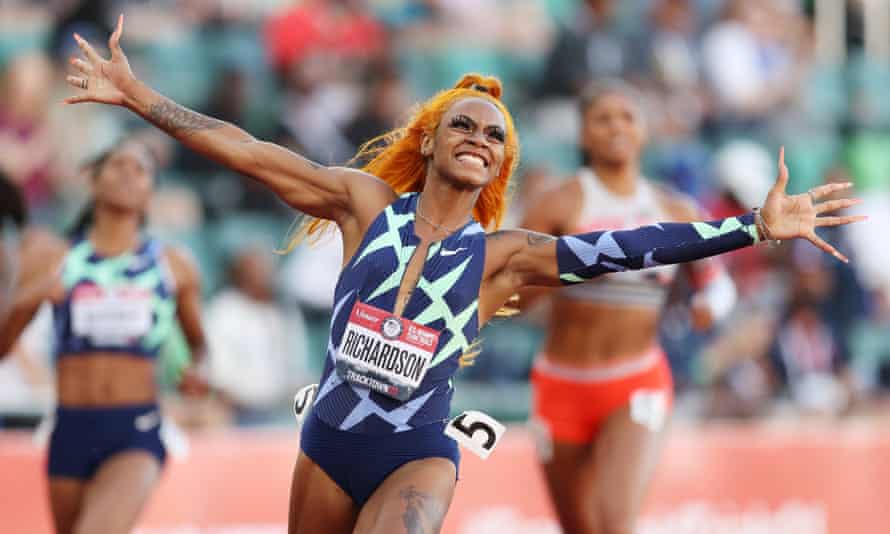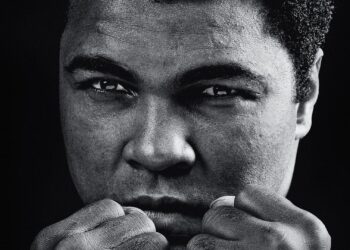By: Zachary Draves
She boldly proclaimed that she was that girl at the Olympic Trials.
Sha’Carri Richardson epitomizes black girl magic to the fullest.
She is resilient, strong, unafraid to be vulnerable, compassionate, loving, and unapologetically black and queer.
Her dazzling speed during the trials in Eugene, Oregon in which she solidified her rightful spot on the team in the 100 meters at 10.86 seconds made her an instant sensation.
Her colorful hairstyles and long decorative fingernails made her the Florence Griffith Joyner of her generation, exuding black beauty and femininity with pride.
It was also her journey to get to this point that won our hearts.
A week prior to the trials, she had learned that her biological mother had passed away and after the race, she spoke so movingly about that moment and gave credit to her beloved grandmother and girlfriend for playing a tremendous part in helping her during this time.
She was on the cusp of bringing that magic along with a venerable justice league of black women athletes to Tokyo but ultimately the powers that be clamped down on that momentum.
After it was revealed that Sha’Carri had tested positive for marijunana, she was placed on a one-month suspension putting her participation in the games in doubt which begin on July 23.
Her suspension ends on July 27th which ultimately makes her ineligible to compete in the 100 meters but she could be eligible for the 4×100 relay scheduled for August 5.
This move to suspend her was completely unjustified, lacks any sense of reality and data, and reinforced racial bias when it comes to drug use.
It should be noted that marijuana is in no way a performance-enhancing drug and you don’t have to be an expert to understand that.
But to get an expert’s opinion, I talked to Paul Armentano, Deputy Director of the National Organization for the Reform of Marijuana Laws (NORML).
While a growing number of athletes have reported turning to cannabis and its components as an alternative to certain prescription drugs (e.g., opioids), there exists no scientific consensus that the acute effects of marijuana enhances athletic performance. It is also highly unlikely that top-level athletes are consuming cannabis prior to taking part in athletic competitions. Unfortunately, conventional drug screening can only identify the presence of past marijuana use — which may be indicative of exposure some days, weeks, or even months before-hand.
In other words, these tests are more about identifying those who may choose to consume cannabis in their off-time to relax rather than they are about identifying athletes seeking an unfair competitive advantage.
Given the rapidly changing laws and cultural opinion surrounding cannabis, it makes no sense for these regulatory bodies to take punitive actions against those athletes, who like millions of others around the globe, choose to consume a substance in their off-time that is objectively safer than alcohol and/or many prescription medications.
It is also profoundly ironic that in a state like Oregon which legalized the medical and recreational use of marijuana in 2015 would be the site of this arbitrary rule.
We must not also forget the clear racial element in this issue that goes well beyond the individual circumstances surrounding Sha’Carri.
The failed War on Drugs that has been ongoing for the last fifty years in which draconian laws classifying drug usage as a crime issue rather than a public health issue has resulted in an explosion in the prison population with clear racial disparities.
- According to the World Population Review, about 25% of the world’s total prison population is in the United States, which holds about 2.19 million prisoners as of 2019 (1.38 million in federal and state prisons, 745,200 in jails). https://worldpopulationreview.com/state-rankings/prison-population-by-state
- The Federal Bureau of Prisons indicates that Black Americans make up at least 38% of the prison population while only making up 13% of the US population. https://www.bop.gov/about/statistics/statistics_inmate_race.jsp
- The ACLU indicates that although marijuana usage rates between whites and non-whites are similar, Black Americans are arrested for these offenses nearly four times the rate compared to whites. https://www.aclu.org/news/criminal-law-reform/a-tale-of-two-countries-racially-targeted-arrests-in-the-era-of-marijuana-reform/
So it is evident that the so-called War on Drugs was really a war on black people.
All this is about is making Sha’Carri Richardson, just like society does with other black athletes, a poster child for supposed bad behavior even though she did nothing wrong.
I implore that those of good conscience will stand by her and support her every step of the way.
This gives further reason why athletes going to Tokyo should defy the draconian Rule 50 that prohibits political protest and voice their principled opposition against systemic racism.
Hopefully, this could be a turning point when it comes to changing the course of history when it comes to drug laws.
The same way that Len Bias’s death was exploited to weaponize the War on Drugs, this situation could be used to right the wrongs and move us ahead.
A simple stroke of a pen by the White House could be the starting point and passage of a comprehensive marijuana reform bill by Congress could be a long-term solution.
In the meantime, Sha’Carri deserves our love, support, and solidarity.
She is still that girl.
#LetHerRun.


 NFL
NFL






@DravesZachary Naomi Osaka, Simone Biles and now…Sha’ Carri Richardson. The struggle just continues these women. Keep up bringing all this issues to the forefront. Great Work!